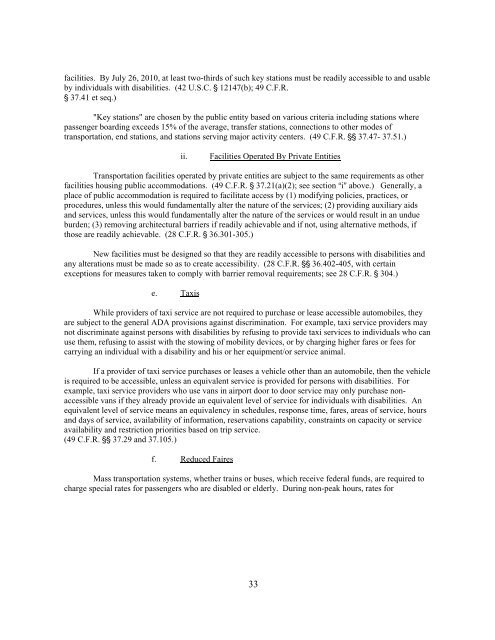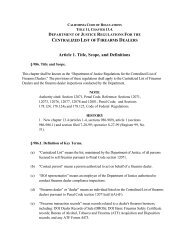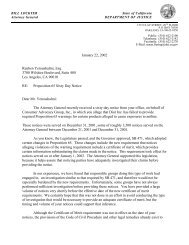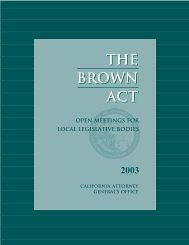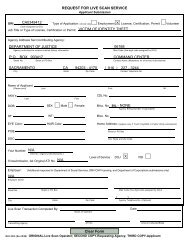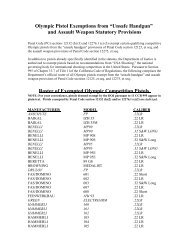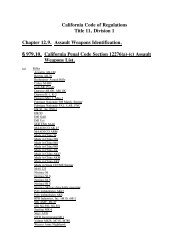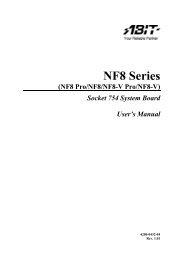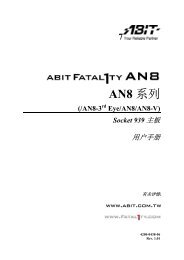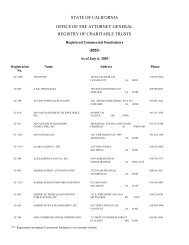Legal Rights of Persons With Disabilities - Ossh.com
Legal Rights of Persons With Disabilities - Ossh.com
Legal Rights of Persons With Disabilities - Ossh.com
Create successful ePaper yourself
Turn your PDF publications into a flip-book with our unique Google optimized e-Paper software.
facilities. By July 26, 2010, at least two-thirds <strong>of</strong> such key stations must be readily accessible to and usable<br />
by individuals with disabilities. (42 U.S.C. ' 12147(b); 49 C.F.R.<br />
' 37.41 et seq.)<br />
"Key stations" are chosen by the public entity based on various criteria including stations where<br />
passenger boarding exceeds 15% <strong>of</strong> the average, transfer stations, connections to other modes <strong>of</strong><br />
transportation, end stations, and stations serving major activity centers. (49 C.F.R. '' 37.47- 37.51.)<br />
ii.<br />
Facilities Operated By Private Entities<br />
Transportation facilities operated by private entities are subject to the same requirements as other<br />
facilities housing public ac<strong>com</strong>modations. (49 C.F.R. ' 37.21(a)(2); see section Ai@ above.) Generally, a<br />
place <strong>of</strong> public ac<strong>com</strong>modation is required to facilitate access by (1) modifying policies, practices, or<br />
procedures, unless this would fundamentally alter the nature <strong>of</strong> the services; (2) providing auxiliary aids<br />
and services, unless this would fundamentally alter the nature <strong>of</strong> the services or would result in an undue<br />
burden; (3) removing architectural barriers if readily achievable and if not, using alternative methods, if<br />
those are readily achievable. (28 C.F.R. ' 36.301-305.)<br />
New facilities must be designed so that they are readily accessible to persons with disabilities and<br />
any alterations must be made so as to create accessibility. (28 C.F.R. '' 36.402-405, with certain<br />
exceptions for measures taken to <strong>com</strong>ply with barrier removal requirements; see 28 C.F.R. ' 304.)<br />
e. Taxis<br />
While providers <strong>of</strong> taxi service are not required to purchase or lease accessible automobiles, they<br />
are subject to the general ADA provisions against discrimination. For example, taxi service providers may<br />
not discriminate against persons with disabilities by refusing to provide taxi services to individuals who can<br />
use them, refusing to assist with the stowing <strong>of</strong> mobility devices, or by charging higher fares or fees for<br />
carrying an individual with a disability and his or her equipment/or service animal.<br />
If a provider <strong>of</strong> taxi service purchases or leases a vehicle other than an automobile, then the vehicle<br />
is required to be accessible, unless an equivalent service is provided for persons with disabilities. For<br />
example, taxi service providers who use vans in airport door to door service may only purchase nonaccessible<br />
vans if they already provide an equivalent level <strong>of</strong> service for individuals with disabilities. An<br />
equivalent level <strong>of</strong> service means an equivalency in schedules, response time, fares, areas <strong>of</strong> service, hours<br />
and days <strong>of</strong> service, availability <strong>of</strong> information, reservations capability, constraints on capacity or service<br />
availability and restriction priorities based on trip service.<br />
(49 C.F.R. '' 37.29 and 37.105.)<br />
f. Reduced Faires<br />
Mass transportation systems, whether trains or buses, which receive federal funds, are required to<br />
charge special rates for passengers who are disabled or elderly. During non-peak hours, rates for<br />
33


